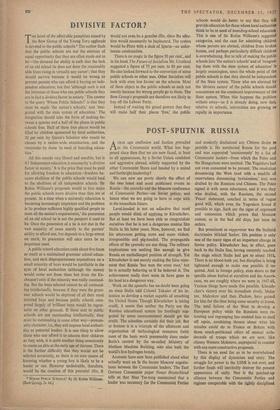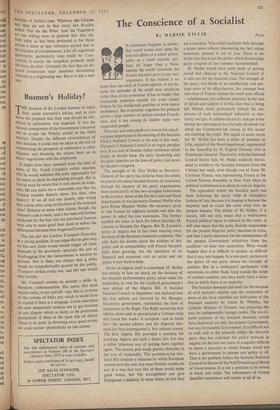POST-SPUTNIK RUSSIA
A YEAR ago confusion and faction prevailed
A
in the Communist world. What has hap- pened since then that we are now faced, at least to all appearances, by a Soviet Union confident and aggressive abroad, solidly supported by the other Communist States and headed by a united and forthright leadership?
We can now see pretty clearly the effect of the two latest and most publicised events in Russia—the sputniks and the Moscow conference of Communist Parties—on Soviet policy; and hence what we are going to have to cope with in the immediate future.
Level-headed is not an adjective that most people would think of applying to Khrushchev.
But at least we have been able to congratulate ourselves that he is not a dangerous maniac like Stalin in his latter years. Now, however, we find his utterances getting more and more violent, irresponsible and pig-headed. The propaganda effects of the sputniks are one thing. The military implications are nothing like enough to give Russia an unchallenged position of strength. Yet Khrushchev is not merely making the false state- ment that Russia 'has won the arms race,' but he is actually behaving as if he believed it. The achievement really does seem to have gone to his head in a dangerous way.
Work on the sputniks has no doubt been going on since Stalin told Colonel Tokaiev of his in- tention to develop a rocket capable of smashing the United States. Though Khrushchev is taking credit, it seems that neither the Party nor the Russian educational system (as footlingly sug- gested by some commentators) should get the credit. The scientists certainly did their job. But at bottom it is a triumph of the allotment and organisation of technological resources (with most of the basic work presumably done under Beria's control by the so-called Ministry of Medium Machine Building, who also built the world's first hydrogen bomb).
Accounts have now been published about what actually went on in the recent Moscow negotia- tions between the Communist leaders. The East German Communist paper News Deutschland tells us that Mao Tse-tung maintained that a leader was necessary for the Communist Parties and modestly disclaimed any Chinese desire to provide it. He nominated Russia for the post and was supported 'unanimously' by a list oQ Communist leaders—from which the Poles and the Hungarians were omitted. The Yugoslays had not even consented to be present. The resolution denouncing the West (and with a muddle of reservations denouncing 'revisionism,' too) was drafted by the Russians and Chinese. The Poles signed it with some reluctance, and it was they who drafted, with the Russians, the second 'Peace' statement, couched in terms of vague good will, which even the Yugoslays found it possible to sign. Such arc the signs of argument and concession which prove that Moscow, cannot, as in the bad old days, just issue its orders.
But prominent as rapporteur was the Stalinist doctrinaire Mikhail Suslov. His position is only one of the many signs of an important change in Soviet policy. Khrushchev has, in effect, gone back to the Stalin line, having currently reached the stage which Stalin had got to about 1931; There is no blood-bath yet, but discipline is being tightened enough to make one possible if re. quired. And in foreign policy, even down to the specific abuse hurled at ourselves and the Amer& cans, we are roughly where we were in 1947-48. Various things have made this possible. Khrush. chev's victory over his immediate rivals, Molo- tov, Malenkov and then Zhukov, have gained for him for the time being some security at home. The total failure of the West to develop a European policy while the Russians were re- treating and regrouping has enabled him to start off again, combining threats about what his missiles could do to France or Britain with those much-publicised offers of mutual with- drawals of troops which we are now, like clumsy Western Molotovs, unprepared to counter with any more constructive proposals.
There is no need for us to be overwhelmed by this display of dynamism and unity. The struggle for power in the USSR is not over, and further feuds will inevitably destroy the present appearance of unity. Nor is the patched-up alliance between the Communist Parties and regimes comparable with the tightly disciplined machine of Stalin's time. Whatever the Chinese saY, they do not in fact carry out Russian Orders. Nor do the Poles. And the Yugoslays are not willing even to pretend that they do. Such unity as has been produced is for these Parties a more or less voluntary accord due to the pressure of circumstances. Like all negotiated agreements, particularly ones made by Com- munists, it carries the unspoken protocol 'until the times do alter.' Certainly the fact that an ob- sessed totalitarian ruler possesses devastating 'Aeapons is a frightening one. But it is not a new
one.







































 Previous page
Previous page